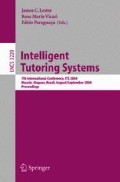Abstract
Why/AutoTutor is an intelligent tutoring system for conceptual physics that guides learning through tutorial dialog in natural language. It adapts to student contributions within dialog turns in both a conversationally appropriate and pedagogically effective manner. It uses an animated agent with synthesized speech to engage the student and provide a human-like conversational partner. Why/AutoTutor serves as a learning scaffold throughout the tutoring session and facilitates active knowledge construction on the part of the student. Why/AutoTutor has recently been compared with an ideal information delivery system in order to assess differences in learning gains, the factors that contribute to those gains, and the retention of that knowledge.
Access this chapter
Tax calculation will be finalised at checkout
Purchases are for personal use only
Preview
Unable to display preview. Download preview PDF.
References
Graesser, A.C., Jackson, G.T., Mathews, E.C., Mitchell, H.H., Olney, A., Ventura, M., Chipman, P., Franceschetti, D., Hu, X., Louwerse, M.M., Person, N.K., TRG: Why/AutoTutor: A test of learning gains from a physics tutor with natural language dialog. In: Alterman, R., Hirsh, D. (eds.) Proceedings of the 25th Annual Conference of the Cognitive Science Society, pp. 1–6. Cognitive Science Society, Boston (2003)
Graesser, A.C., Lu, S., Jackson, G.T., Mitchell, H., Ventura, M., Olney, A., Louwerse, M.M.: AutoTutor: A tutor with dialog in natural language. Behavioral Research Methods, Instruments, and Computers (in press)
Graesser, A.C., Wiemer-Hastings, K., Wiemer-Hastings, P., Kreuz, R., TRG: TRG: AutoTutor: A simulation of a human tutor. Journal of Cognitive Systems Research 1, 35–51 (1999)
Graesser, A.C., VanLehn, K., Rose, C., Jordan, P., Harter, D.: Intelligent tutoring systems with conversational dialogue. AI Magazine 22, 39–51 (2001)
Graesser, A.C., Person, N.K., Magliano, J.P.: Collaborative dialog patterns in naturalistic one-to-one tutoring. Applied Cognitive Psychology 9, 1–28 (1995)
Graesser, A.C., Wiemer-Hastings, P., Wiemer-Hastings, K., Harter, D., Person, N., The TRG: Using latent semantic analysis to evaluate the contributions of students in AutoTutor. Interactive Learning Environments 8, 129–148 (2000)
Landauer, T.K., Foltz, P.W., Laham, D.: An introduction to latent semantic analysis. Discourse Processes 25, 259–284 (1998)
Jackson, G.T., Mueller, J., Person, N., Graesser, A.C.: Assessing the pedagogical effectiveness and conversational appropriateness in three versions of AutoTutor. In: Moore, J.D., Redfield, C.L., Johnson, W.L. (eds.) Artificial Intelligence in Education: AIED in the Wired and Wireless Future, pp. 263–267. OIS Press, Amsterdam (2001)
Person, N.K., Graesser, A.C., Kreuz, R.J., Pomeroy, V., TRG: Simulating human tutor dialog moves in AutoTutor. International Journal of Artificial Intelligence in Education 12, 23–39 (2001)
Hewitt, P.G.: Conceptual physics, 8th edn. Addison-Wesley, Reading (1992)
Olde, B.A., Franceschetti, D.R., Karnavat, Graesser, A.C., the TRG: The right stuff: Do you need to sanitize your corpus when using latent semantic analysis? In: Proceedings of the 24th Annual Conference of the Cognitive Science Society, pp. 708–713. Erlbaum, Mahwah (2002)
Foltz, P.W., Gilliam, S., Kendall, S.: Supporting content-based feedback in on-line writing evaluation with LSA. Interactive Learning Environments 8, 111–127 (2000)
Kintsch, W.: Comprehension: A paradigm for cognition. Cambridge University Press, Cambridge (1998)
Chi, M.T.H., Siler, S., Jeong, H., Yamauchi, T., Hausmann, R.G.: Learning from human tutoring. Cognitive Science 25, 471–533 (2001)
Fox, B.: The human tutorial dialog project. Erlbaum, Hillsdale (1993)
Moore, J.D.: Participating in explanatory dialogs. MIT Press, Cambridge (1995)
Graesser, A.C., Moreno, K., Marineau, J., Adcock, A., Olney, A., Person, N.: AutoTutor improves deep learning of computer literacy: Is it the dialog or the talking head? In: Hoppe, U., Verdejo, F., Kay, J. (eds.) Proceedings of Artificial Intelligence in Education, pp. 47–54. IOS Press, Amsterdam (2003)
VanLehn, K., Graesser, A.C.: Why2 Report: Evaluation of Why/Atlas, Why/AutoTutor, and accomplished human tutors on learning gains for qualitative physics problems and explanations. Unpublished report prepared by the University of Pittsburgh CIRCLE group and the University of Memphis Tutoring Research Group (2002)
Hestenes, D., Wells, M., Swackhamer, G.: Force Concept Inventory. The Physics Teacher 30, 141–158
Author information
Authors and Affiliations
Editor information
Editors and Affiliations
Rights and permissions
Copyright information
© 2004 Springer-Verlag Berlin Heidelberg
About this paper
Cite this paper
Jackson, G.T., Ventura, M., Chewle, P., Graesser, A. (2004). The Impact of Why/AutoTutor on Learning and Retention of Conceptual Physics. In: Lester, J.C., Vicari, R.M., Paraguaçu, F. (eds) Intelligent Tutoring Systems. ITS 2004. Lecture Notes in Computer Science, vol 3220. Springer, Berlin, Heidelberg. https://doi.org/10.1007/978-3-540-30139-4_47
Download citation
DOI: https://doi.org/10.1007/978-3-540-30139-4_47
Publisher Name: Springer, Berlin, Heidelberg
Print ISBN: 978-3-540-22948-3
Online ISBN: 978-3-540-30139-4
eBook Packages: Springer Book Archive

